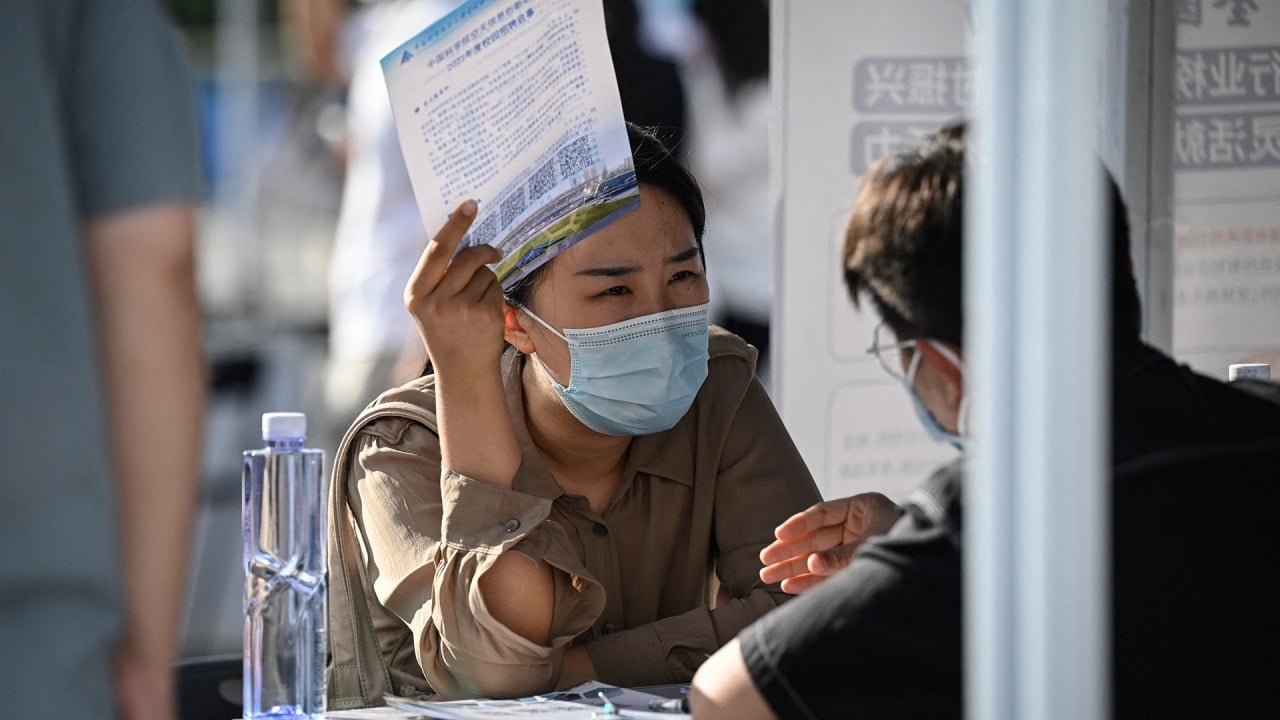But she resigned after just 15 months and returned to Shanghai in January for a cross-border e-commerce job, although that role has lasted just four months, and she will leave in a few weeks.
I’m stuck in a rat race and unable to find peace even if I want to lie flat
“I get anxious without a job, while I feel depressed by the pressure when I have a job,” added Jiang. “I’m stuck in a rat race and unable to find peace even if I want to lie flat”.
“Lying flat”, or tang ping, is a Chinese term used to describe people who work just enough to afford to spend their time on what they enjoy.
Born in the northwestern Ningxia Hui autonomous region, Jiang would find it difficult to return home due to the limited job opportunities, but she still considers herself lucky to remain active in the job market, as an increasing number of China’s young people are facing unemployment.
Beijing is also faced with a sluggish private sector, while China’s young people are under pressure from a mismatch between their white-collar job aspirations and available opportunities.
China, though, is not alone in facing the challenge of youth employment. In February, Spain’s unemployment rate for its 16 to 24 age group reached 28.2 per cent, while in Italy the figure stood at 22.82 per cent, just ahead of 22.3 per cent in Sweden.
However, in the US, the rate remained at a seasonally adjusted 8.8 per cent in March, according to Trading Economics.
Xu Hanren, a 36-year-old microbusiness owner, registered a pharmaceutical testing firm in Fujian province in 2021 and came to Shanghai to recruit staff this year.
Xu offered a position with a non-fixed salary ranging from 1,000 yuan (US$138) to 6,000 yuan per month – lower than the range of between 7,000 yuan and 12,000 for fresh graduates in Shanghai for the industry – yet within a few days he had already received more than 60 résumés.
“Most jobseekers are in their mid-20s to 30s, but I also got some CVs from people over 35, and one even had a PhD,” Xu said.
“I’m unable to extend more job offers. In 2021, I was seeing approximately 60 per cent profit from my revenues, yet since April last year, it had declined to 40 per cent.
“The funding from investors has already been delayed by two months, and expanding our team would only increase the risk to my company. I’m even considering further reductions in my staff.”
China’s private sector is often said to contribute over 50 per cent of tax revenues and more than 80 per cent of urban employment, while it constitutes over 90 per cent of the total number of enterprises.
‘I’ve shed all idealistic work expectations’: China’s jobseekers face reality
‘I’ve shed all idealistic work expectations’: China’s jobseekers face reality
“Private businesses hold low confidence in the market, large companies are increasing lay-offs and small ones are hesitant to recruit, and these situations have intensified job competition,” said Peng Peng, executive chairman of the Guangdong Society of Reform.
A survey of 1,410 private companies in China, conducted by the Beijing-based Dacheng Law Office, showed 41 per cent of private firms experienced revenue growth last year, while 34 per cent reported a decline.
According to the survey released on Monday, 49 per cent of private firms intend to make modest increases to their workforce over the next two years, while 26 per cent plan to maintain current staffing levels and 6 per cent are considering staff reductions.
This year, despite submitting over 300 CVs, I’ve only received five interview invitations, all of which unfortunately did not result in success
For two consecutive years, 25-year-old Shanghai graduate Li Han Qing has attended on-campus job fairs, finding a dwindling number of job opportunities each year.
“Two years ago, I submitted approximately 100 CVs and consistently received a flood of interview invitations. There were times when I needed to join three consecutive interviews in one day,” said Li, who is originally from the eastern Jiangsu province.
“This year, despite submitting over 300 CVs, I’ve only received five interview invitations, all of which unfortunately did not result in success.”
Li plans to explore freelancing opportunities in her hometown of Nantong if she continues to see limited job prospects in Shanghai.
Since they can still lean on their parent’s financial support, some are reluctant to seek jobs immediately
“I don’t want to lie flat, but the job situation is forcing me to make this choice,” she added.
China reported an incremental gross domestic product of 6 trillion yuan (US$828 billion) in 2023, which the NBS said could create at least 10 million additional jobs.
In 2024, China said it is aiming to create over 12 million jobs in urban areas, having created 12.44 million in 2023.
On Tuesday, the Ministry of Labor and Human Resources said China created 3.03 million new jobs in the first quarter of 2024.
“There’s a ‘laying flat’ culture among young Chinese, and the fierce job market offers them limited chances of finding a well-paid, stable job,” Peng added.
“Since they can still lean on their parent’s financial support, some are reluctant to seek jobs immediately.”
Peng said Beijing should consider providing tax incentives to companies based on their employment, and create more job opportunities for young people in high-demand service sectors, such as domestic assistance, elderly care and healthcare.
Beijing has pledged to increase support for young jobseekers through skills training in high-demand sectors, such as advanced manufacturing, modern services and elderly care, the Ministry of Human Resources and Social Security said on Tuesday.
But for the next decade, youth unemployment would still be a pressing issue as China’s 16 to 24 age group is set to peak at 161 million in 2033 from the current level of around 96 million, leading to high levels of new workers entering the labour force, the China Academy of Labour and Social Security said in November
And the job participation rate among the age group is expected to decline due to increasing college enrolment and a slower employment mindset among graduates, the institute added.

